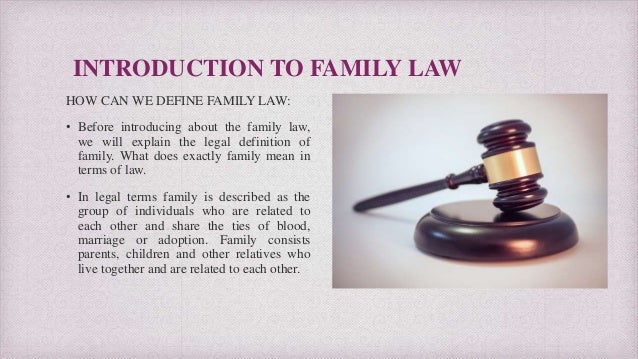
Image source: https://image.slidesharecdn.com/sarifriedmanlawyer-161125123555/95/sari-friedman-lawyer-brief-introduction-and-explanation-about-famiy-laws-2-638.jpg?cb=1485770356
Grounds For Divorce
Most jurisdictions require that before a divorce can be sanctioned, there be a reason for the divorce that is both legally valid and accepted. Common grounds for divorce include adultery, the commission of a crime against the other spouse, or more commonly some general provision about the unworkability of the marriage, whether as a result of a gradual deterioration in personal relationships or simply as a result of a significant row or fight. Of course where this is disputed the court will look into the matter and rule accordingly, although most jurisdictions do now have some form of general, uncontestable provision like a simple 'breakdown of marriage' clause.
Length Of Marriage
In most instances there will be a minimum default length of time marriages must run for before a divorce can be sanctioned. Whilst in certain occasions there are no minimums, most jurisdictions impose a two year rule, or a five year rule, by which the court must abide in granting any decree of separation. This is designed to protect the sanctity of marriage to at least a certain degree and to ensure that people do understand prior to getting married that there is a legal tie-in period, on public policy grounds. However this area of divorce law in particular is rapidly changing, and may ultimately find itself out of favour worldwide.
Fairness
In terms of any settlement there is usually an overriding principle of fairness adopted by the courts in working out who gets what. Of course there may very well be strict legal rules as to what is decided but, particularly in common law systems, there is an overall consideration of what is fair on both parties and what is just or equitable given the circumstances of the split. Obviously as an area of personal life, the courts will look to attempt to gain the best possible ground for both parties, even where one party is staunchly opposed to the other gaining any ground whatsoever. For this reason it's probably best to save everyone the hassle and agree on something that is objectively fair from the outset.
Division Of Property
Of course, one of the major issues arising from divorce is that of division of property. Whilst it is different in each jurisdiction, the higher earner or higher net wealth spouse can expect to lose out overall to the other spouse, provided there have been no pre nuptial agreements drafted to the contrary. As a result, it's again probably best to go for an out of court solution if you think this may end up affecting your financial health.
